Related Research Articles
Alternative media are media sources that differ from established or dominant types of media in terms of their content, production, or distribution. Sometimes the term independent media is used as a synonym, indicating independence from large media corporations, but this term is also used to indicate media enjoying freedom of the press and independence from government control. Alternative media does not refer to a specific format and may be inclusive of print, audio, film/video, online/digital and street art, among others. Some examples include the counter-culture zines of the 1960s, ethnic and indigenous media such as the First People's television network in Canada, and more recently online open publishing journalism sites such as Indymedia.
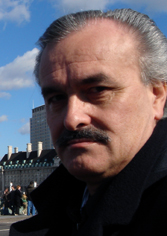
Alfonso Gumucio Dagron is a Bolivian writer, filmmaker, journalist, photographer and development communication specialist. His father was Alfonso Gumucio Reyes, a leader of the Movimiento Nacionalista Revolucionario (MNR), Minister of Economy during the Government of Víctor Paz Estenssoro, and Ambassador to Uruguay and Spain. He is the author of several books on film and [communication for social change, as well as documentary films, photographic exhibits and hundreds of articles in journals. He has worked in five continents on social development projects, as a communication for development specialist.
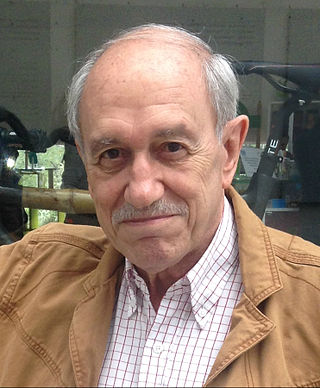
Néstor García Canclini is an Argentinian academic and anthropologist known for his theorization of the concept of "hybridity."
Ethnic media is media fashioned with a particular ethnic minority group or ethnic minority community in mind.
Jorge B. Rivera (1935–2004) was an Argentine poet, essayist, critic, journalist and researcher on issues of history and popular culture. He was born in Buenos Aires in 1935 and died on August 27, 2004. He is considered a pioneer in research in mass communication in Argentina.

María Elena Meneses Rocha was a Mexican journalist, professor of journalism and researcher into media, communications and the Internet with the Monterrey Institute of Technology and Higher Education, Mexico City. On the campus she taught and was the coordinator of the Cátedra Sociedad de la Información, which does research and consulting in mass media and information technology. She also worked with mass media, as a writer and as a commentator for print, broadcast and Internet media, mostly commenting on information technologies.

Delia Crovi Druetta is a professor and researcher in communications and Latin American studies at the Universidad Nacional Autónoma de México, member of the Sistema Nacional de Investigadores, Level III.
María de la Luz Casas Pérez was a Mexican professor and researcher with the Monterrey Institute of Technology and Higher Studies, in the field of communications and politics. Her research work has been recognized by the Mexican government with Level II membership in the Sistema Nacional de Investigadores.

Jesús Martín-Barbero was a Spanish-Colombian communication scientist.
James Lull is an American social scientist and author known for ethnographic research on the interaction between communications technology and culture. In addition to his academic career, Lull worked for many years as a media professional. His most recent scholarly work focuses on the decisive role of communication in human evolution.
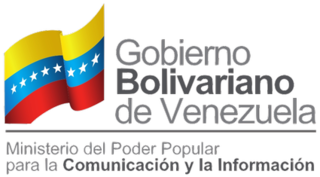
The Ministry of Popular Power for Communication and Information (Minci) is a public ministry of the Government of Venezuela dedicated to communication, informing the Venezuelan public and promoting the Venezuelan government.
Eliseo Roberto Colón Zayas is a Puerto Rican communication, semiotician, cultural theorist and mass media researcher who specializes in Latin American Mass Media Studies, Semiotics, Cultural Studies, Mass Media Culture, Discourse Analysis, Aesthetics and Advertising Discourse.
Javier Esteinou Madrid is a Mexican journalist, professor and researcher whose work has been recognized with Level III membership in the Sistema Nacional de Investigadores and with Mexico’s National Journalism Prize twice. His work is mostly concerned with the effects of cultural hegemony and new technologies on communications and society.

Sofía Montenegro Alarcón is a Nicaraguan journalist, social researcher, and feminist. Montenegro's family were militarily aligned with the Somoza forces, but her feminist and Marxist studies moved her to join with the opposition to the regime. She fought in the Sandinista Revolution and though initially supportive of the Sandinista Party, later became an outspoken critic, saying it had moved to the right. She served as an editor of various divisions of the official Sandinista newspaper, Barricada, until 1994, when she founded the Center for Communication Research (CINCO) as an independent research organization free of government influence. She has written broadly on power, gender, and social interaction.

Carlos Alberto Scolari is a researcher and expert in communication and digital media, interfaces and communication ecology. Building on the tradition of the theories of mass media, since 1990, he has been dedicated to studying new forms of communication arising from the spread of the World Wide Web.

Ismael Crespo Martínez is a political scientist and expert in Latin America, Professor of Political science at the University of Murcia, Spain, and director of the Department of Political Science and Administration at the same university. In addition, he runs MásPoderLocal, a digital magazine on political communication and electoral behavior focused on Spain and Latin America. Since 2012, he is the president of the Latin American Association of Electoral Campaign Researchers.
Grupo Radial Colombiano was a Colombian radio network founded in 1979 by brothers Miguel and Gilberto Rodríguez Orejuela, heads of the Cali Cartel. In 1984, the Rodríguez brothers transferred their stocks in the network to journalists and executives after the media published their links to the network.
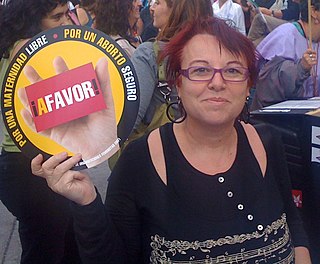
Montserrat Boix Piqué is a Spanish journalist, considered among the most influential women in her country. In early 2000, she created and developed the concepts of social cyberfeminism, and a year later those of feminist hacktivism. Another of her main areas of work is gender violence and communication. She has also stood out as a defender of the right to communication and citizenship rights for women. Since 1986, she has been a journalist for the Information Services of Televisión Española (TVE), in the international section.
Rosa Palomino Chahuareses was an Aymara Indigenous leader, journalist, human rights activist, and social leader in Peru. In 2014, the Ministry of Culture presented her with an award for her work in developing community radio for women.
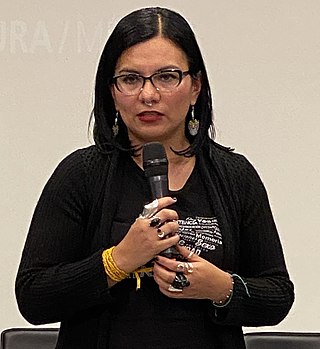
Raquel Ramírez Salgado is a Mexican researcher, communicator, feminist and women's rights activist.
References
- ↑ "About Us: OURMedia/NUESTROSMedios". 1 May 2004. Archived from the original on 1 May 2004. Retrieved 21 May 2023.
- ↑ Chris Atton Edinburgh Napier University [ dead link ]
- ↑ "Staff in MCCS". Goldsmiths, University of London. Archived from the original on 31 January 2008. Retrieved 21 May 2023.
- ↑ "RTV". Archived from the original on 7 August 2007. Retrieved 21 May 2023.
- ↑ Global Media and Communication 2006 2: 277
- ↑ Croteau, D and Hoynes, W: Media Society: Industries, Images and Audiences (third edition), page 301, Pine Forge Press, Thousand Oaks, 2003
- ↑ Meikle, G: “Networks of Influence: Internet Activism in Australia and Beyond” in Gerard Goggin (ed.) Virtual nation: the Internet in Australia, University of New South Wales Press, Sydney, 2004
- ↑ Croteau, D and Hoynes, W, Media Society: Industries, Images and Audiences, page 313, 2003